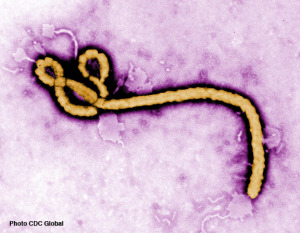
Read the facts about Ebola from the Western Connecticut Health Network.
Report by Paula Antolini
Oct 27, 2014 1:44PM EDT
Message from Connecticut State Representative Dan Carter (Republican Carter represents Bethel, Danbury, Newtown and Redding):
Dear Friends & Neighbors,
I want all residents to feel safe and informed on how Connecticut is working to fight Ebola. However, I realize the extensive news coverage on the issue is quite overwhelming. Therefore, I would like to share the straightforward Ebola Question-and-Answer series compiled by the Western Connecticut Health Network.
Below you will find all the need-to-know information in one place – Please take a moment to review this so that you may be prepared for how this issue could affect you and your loved ones.
Thank you!
As always, if you have questions or concerns about state government please do not hesitate to contact me at your convenience at: 1-800-842-1423
Best Regards,
Dan Carter
*****
Ebola Q&A
*****
What is Ebola Virus Disease?
Ebola, previously known as Ebola hemorrhagic fever, is a very serious disease caused by infection with one of the Ebola virus strains.
How is Ebola transmitted?
Ebola viruses are transmitted through direct contact with blood or body fluids. Ebola is not spread through the air or by water, or in general, food. That means that body fluids (blood, saliva, mucus, vomit, urine, feces or semen) from an infected person (alive or dead) have touched someone’s eyes, nose, or mouth or an open cut, wound, or abrasion. Insects do not transmit Ebola.
Can Ebola spread by coughing or sneezing?
Ebola is not a respiratory illness like many flu or measles viruses that can be transmitted by air particles after an infected person coughs or sneezes. Ebola is only transmitted by direct contact with body fluids of a person who has active symptoms of Ebola disease. Coughing and sneezing are not common symptoms of Ebola. However, if a patient with Ebola coughs or sneezes on someone, and saliva or mucus come into contact with that person’s eyes, nose or mouth, these fluids may transmit the disease.
Has WCHN had an Ebola patient?
No, we have not had any confirmed or suspected cases of Ebola in any of our Network hospitals.
Is the network prepared for Ebola?
Yes. We began planning and preparing for Ebola in August. Staff awareness and education have been ongoing and more intensive training for front-line staff is underway. We are very confident in our organization’s ability to screen, detect and isolate Ebola patients.
How is WCHN protecting its patients, visitors, staff and community from Ebola?
Safety is a top priority. WCHN has a comprehensive infection control process and our staff is expertly-trained and prepared to take care of patients with a variety of infectious diseases, including Ebola. We are encouraging prevention practices and following all federal guidelines of the Centers for Disease Control (CDC) protocols, including immediately isolating the patient and taking proper infection control precautions to avoid exposure to patients, visitors and staff.
How are facts about Ebola being communicated to staff?
Facts about the Ebola virus are being disseminated to staff through a variety of communication channels and training sessions. Email is a primary distribution channel for employees and physicians. Additional channels include the employee portal, Managers’ Forums, Employee Town Halls, staff meetings and traditional mail.
What signage is in place to educate the public?
Digital signage, along with a series of posters and fliers have been created and distributed throughout the hospitals and off-site locations to raise general awareness and screen for potential risks. Signage advises patients and visitors who have traveled to West Africa over the past 21 days to notify hospital staff. Signage is available in English, Spanish, Greek and Portuguese, reflective of our diverse communities. Additionally, the public can visit hospital websites and social media sites for regular updates.
How are we screening patients?
Physicians and health care providers throughout the hospitals and network are following CDC guidelines and protocols for screening patients at all points of entry. Staff is trained on what to do immediately if a person answers “yes” to any of the screening questions.
What training is planned for staff?
Extensive preparations and training are underway for those with the greatest likelihood of interacting with potentially infected patients. These “super users” are training on and observing the donning and removal of personal protection equipment to ensure full body coverage, as well as proper methods for disposing and destroying used materials. Additional training is planned for “front-line” clinical staff. Training requirements and level of detail will vary based on individual roles in delivering patient care. Training schedules will be shared over the next few days. Training will be offered across the network.
Who is leading the training sessions?
Highly qualified hospital staff members are leading the training sessions. These staff members have been specially trained by the Federal Emergency Management Agency (FEMA) and the Center for Disaster Preparedness (CDP) on how to handle these situations.
What precautions does the CDC require?
To protect hospital patients, visitors and staff, we are following the following CDC precautions:
-Isolating patients with Ebola or Ebola-like symptoms from other patients and non-essential staff.
-Wearing protective clothing, including masks, gloves, gowns, and eye protection.
-Practicing proper infection control and sterilization measures.
-Notifying local and state health officials if anyone has direct contact with the blood or body fluids, such as but not limited to, feces, saliva, urine, vomit, and semen of a person who is sick with Ebola.
How will the hospital isolate patients who may have been exposed to Ebola?
We follow strict CDC protocols relative to isolation of an exposed patient for Ebola or any infectious disease. Patients and visitors are kept at a safe distance from isolation areas and standard precautions are in place. These areas are only accessible by healthcare staff assigned to the medical care of the patient involved. Staff that will caring for patients with infectious diseases like Ebola wear full body protective gear inclusive of masks, face shields, gloves, protective gowns, suits, and other equipment. Personal Protective Equipment (PPE) is available for staff who may need it.
Should patients still keep their scheduled appointments at WCHN hospitals?
Yes. We have no confirmed or suspected cases of Ebola. We are confident that our hospitals are safe for patients, visitors and staff. We want to reassure you that your safety remains our top priority and that all precautions are in place and tested for this and other public health concerns.
Will the hospital release information should a suspected case of Ebola come forward?
Hospital communications will be managed responsibly, adhering to all state and federal guidelines surrounding patient privacy and infection control, along with input and guidance from the CDC and DPH.
How will the hospital monitor staff health in the event the hospital receives a patient or suspected case?
As with any transmissible disease, employee health will be monitored by Infectious Disease, Infection Control and Employee Health.
Where can I find more information about Ebola?
A source of factual information is the Centers for Disease Control and Prevention website. We encourage you to visit: www.cdc.gov/ebola


Leave a Reply